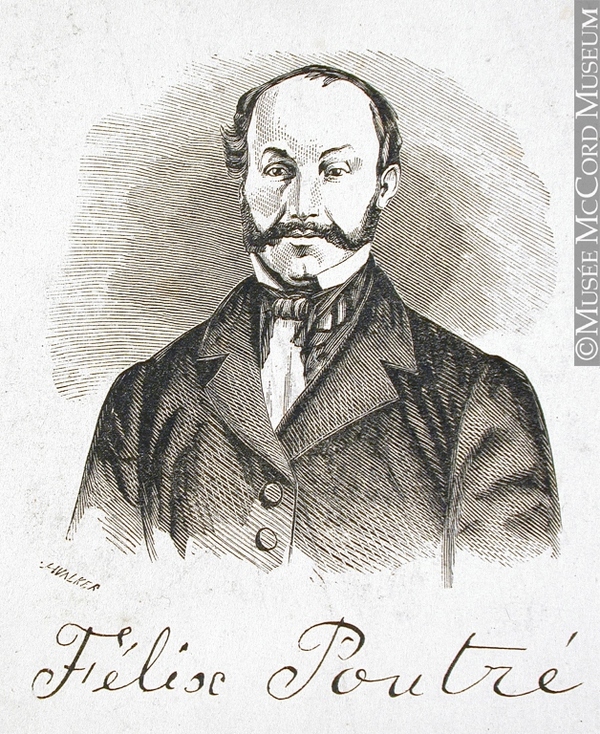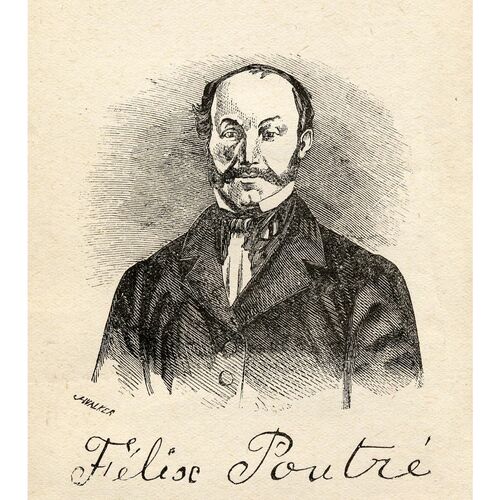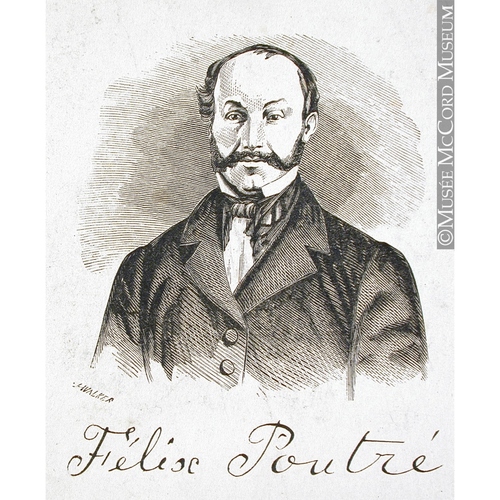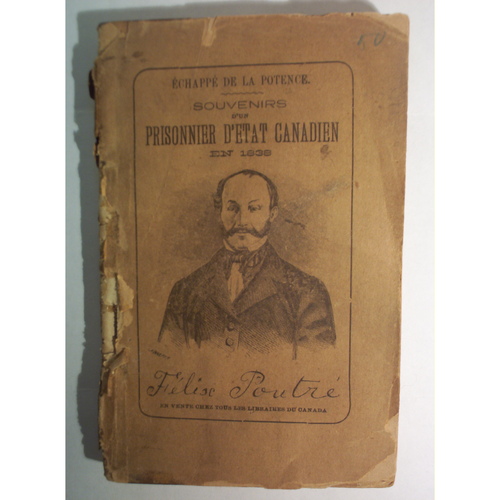
Source: Link
POUTRÉ, FÉLIX, labourer, spy, and merchant; b. 3 Sept. 1814 at Sainte-Marguerite-de-Blairfindie (L’Acadie), Lower Canada, son of Pierre Poutré-Lavigne and Josephte Mercier; m. 28 Aug. 1837 Rose Bénac, at Saint-Jean (Saint-Jean-sur-Richelieu), Lower Canada, and they had five children; d. 22 Feb. 1885 in Montreal, Que.
Little is known about Félix Poutré’s life, and no credence can be given to his autobiographical account, Échappé de la potence: souvenirs d’un prisonnier d’État canadien en 1838, for it is packed with trivia and falsehoods. A farm worker at Saint-Jean at the time of the 1837 rebellion, Poutré had to flee to the United States for unknown reasons after the battle at Saint-Charles-sur-Richelieu on 25 November. He returned the following summer and joined the Association des Frères-Chasseurs [see Robert Nelson*]. Arrested at the beginning of November 1838, he was incarcerated in Montreal on the 13th of that month and released by the attorney general 13 days later. In an affidavit dated 28 Nov. 1839 (but unknown to the public until 1913), sworn before Pierre-Édouard Leclère*, a justice of the peace and the superintendent of police, Poutré described the acts of espionage which he had undertaken since his release from prison. On behalf of the police authorities, he had kept a watch on Patriotes who had fled to the United States or lived in the Saint-Jean region. He then returned to rural life and is thought to have engaged unsuccessfully in trading in hay from 1840 to 1850. In 1872 he was living in Montreal and identified himself as a clerk; in 1880 he termed himself a merchant.
In his autobiography Poutré attempts to project a very different image, that of a hero in the events of 1837–38 and a wily Patriote who managed to escape the death sentence. Bragging, he insinuates that he persuaded more than 3,000 persons to take the secret oath of the Association des Frères-Chasseurs, took part in the battle at Odelltown in November 1838, and surrendered to the authorities in face of the threat that his father’s farm would be burned down. Supposedly he then spent several months in a prison cell, feigning madness to the point that his fellow prisoners and the prison officials believed he had really lost his mind.
A consummate rogue, Poutré succeeded in maintaining a false reputation as a hero thanks to Médéric Lanctot*, who helped him write his story for publication in 1862, and to Louis-Honoré Fréchette*, who adapted it for the stage that year under the title of Félix Poutré ou l’échappé de la potence. The public contributed in large measure to making him an almost legendary figure, for his autobiography ran to three editions during his lifetime (1862, 1869, 1884) and was also translated into English (1862), while Fréchette’s drama was one of the plays most frequently performed throughout Quebec towards the end of the 19th century. Eager to turn his popularity to good account, Poutré gave lectures in the villages of Quebec and the towns of New England and lived for a time on the money brought in by his booklet.
It took the affirmation of Benjamin Sulte* in 1898 that Poutré had been an “employee of the government,” and the disclosure by Gustave Lanctot* in 1913 of compromising documents, to unmask this bogus Patriote. Poutré was then relegated to the ranks of the traitors and spies in the story of the events of 1837 and 1838. What made him an extraordinary man, Ægidius Fauteux* wrote in 1950, “was not that he fooled his gaolers . . . , but that all his life he was able to cash in on his simulated patriotism without being denounced.”
[Félix Poutré was the author of Échappé de la potence: souvenirs d’un prisonnier d’État canadien en 1838 (Montréal, 1862), translated as Escaped from the gallows: souvenirs of a Canadian state prisoner in 1838 (Montreal, 1862). Louis-Honoré Fréchette dramatized the story in 1862, and published the play as Félix Poutré: drame historique en quatre actes (Montréal, [1871]). For more information on these two works see DOLQ, I: 204, 246–48. j.-p.g. and k.l.]
ANQ-Q, QBC 25, Événements de 1837–1838, nos.2812–15. La Minerve, 24 févr. 1885. La Patrie, 23 févr. 1885. La Presse, 23 févr. 1885. Fauteux, Patriotes, 354–56. Gustave Lanctot, Faussaires et faussetés en histoire canadienne (Montréal, 1948), 201–24. Lionel Audet-Lapointe, “Documents inédits sur Félix Poutré,” BRH, 33 (1927): 753–59. Édouard Blondel, “Félix Poutré,” BRH, 32 (1926): 419–21. “Les causes célèbres: Félix Poutré sous ses vrais couleurs,” La Patrie, 27 oct. 1923: 23. Gustave Lanctot, “La fin d’une légende,” Rev. franco-américaine (Montréal), 10 (1912–13): 282–91.
Cite This Article
Jean-Pierre Gagnon and Kenneth Landry, “POUTRÉ, FÉLIX,” in Dictionary of Canadian Biography, vol. 11, University of Toronto/Université Laval, 2003–, accessed December 31, 2025, https://www.biographi.ca/en/bio/poutre_felix_11E.html.
The citation above shows the format for footnotes and endnotes according to the Chicago manual of style (16th edition). Information to be used in other citation formats:
| Permalink: | https://www.biographi.ca/en/bio/poutre_felix_11E.html |
| Author of Article: | Jean-Pierre Gagnon and Kenneth Landry |
| Title of Article: | POUTRÉ, FÉLIX |
| Publication Name: | Dictionary of Canadian Biography, vol. 11 |
| Publisher: | University of Toronto/Université Laval |
| Year of publication: | 1982 |
| Year of revision: | 1982 |
| Access Date: | December 31, 2025 |





